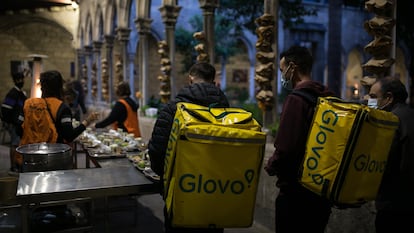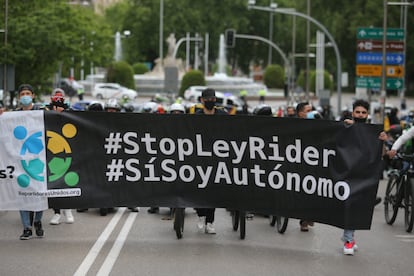Spain approves landmark law recognizing food-delivery riders as employees
The legislation also makes it mandatory for digital platforms to be transparent about how their algorithms affect working conditions

The Spanish Cabinet on Tuesday approved a new royal decree that recognizes food-delivery riders from digital platforms, such as Glovo and Just Eat, as employees and not self-employed workers.
“Today is a day of great satisfaction,” said Labor Minister Yolanda Díaz at a press conference following the Cabinet meeting on Tuesday. According to Díaz, with the approval of the law, “Spain has become a world leader on this issue.” “The world and Europe are both looking to us,” she added.
The so-called “Rider law” is the product of six months of negotiations between unions and business associations, which reached an agreement to reform the labor rights of food-delivery riders in March. These negotiations began after the Supreme Court ruled in favor of a former worker for Glovo last September, arguing that “the relationship that exists between a rider and the Glovo business is of a professional nature.” This was the first time that Spain’s top court had recognized food-delivery workers as employees, rather than being self-employed.
This law protects the most vulnerable because it affects the young people of our country and that’s why what we are doing is so importantLabor Minister Yolanda Díaz
The Supreme Court ruling meant that Spanish businesses had a duty to reform labor relations with food-delivery riders. But if there were any doubts about their status, these have been eradicated by the new law.
“This law protects the most vulnerable because it affects the young people of our country and that’s why what we are doing is so important,” said Díaz. According to the labor minister, who is also a deputy prime minister, 16,794 people have had their work status regularized thanks to the efforts of inspectors. This has had an economic impact of €29 million, she said.
The new law comes into force once it is published in the Official State Gazette (BOE). From that moment, businesses have three months – until August 12 – to make the necessary changes to their working relationships with food-delivery riders.
Many companies in Spain take advantage of what is known in the United States and the United Kingdom as the “gig economy,” a term that refers to workers who are self-employed and work temporary, flexible jobs such as delivering food from a range of establishments to customers. But in recent years, workers in this sector have been demanding recognition as salaried staff and petitioning for the corresponding rights, such as sick leave and paid vacation time.
The new law, however only affects food-delivery riders, not workers of other digital platforms, such as ride-hailing apps.
Algorithm transparency
The law also makes it mandatory for all businesses to inform food-delivery riders about how algorithms and artificial intelligence affect their working conditions, hiring decisions and layoffs.
“Now algorithms are going to be put at the service of the majority in society,” said Díaz. “All commercial companies today use artificial intelligence in one way or another and it is key for us to be courageous and fearlessly govern the technological transition.”
The minister also announced the creation of an expert committee that will assess the government and study “the good use of artificial intelligence and algorithms in labor relations.” Díaz explained: “We will need collective knowledge so that when we reach a more advanced position we will have the aptitude with respect to how we address the use of artificial intelligence in work relations.”
Disparate responses
The approval of the new law sparked varying responses from unions and business associations.
Although the legislation is set to give food-delivery riders more security, it has been rejected by the Delivery Workers United movement on the grounds that it will lead to job losses.

Pepe Álvarez, the secretary-general of the UGT workers union, which took part in the negotiations, celebrated the move on Tuesday. “This is a law that is going to put things in order,” he said during a television interview with the news program La hora de la 1 on state broadcaster TVE.
Carlos Gutiérrez from the labor union CCOO, which also took part in the negotiations, likewise welcomed the law, but said it should have gone further. “This is a law that goes in the right direction because it strengthens the working relationship between riders and forces businesses to offer transparency on the new ways of managing workforces, like the use of algorithms,” he said. But he added: “The text is not as ambitious as we would have liked. We believe that we could have gone further and regularized the different work realities that occur on these digital platforms.”
But the leading association of food-delivery platforms APS, which represents Deliveroo, Stuart, Glovo and UberEats, said it opposes the law. In a press release issued Tuesday, APA warned that the decree “jeopardizes the development of a sector that contributes more than €700 million to Spain’s GDP.” The association also criticized the fact that the law was passed as a royal decree – meaning it was not subject to parliamentary debate – and without consulting “restaurants, platforms, and more surprisingly, the delivery workers themselves.”
The APA also slammed the law for making it mandatory for platforms to make their algorithms more transparent. “While Spain claims to be a start-up nation, this is the first law in Europe that includes the obligation for technological business to reveal their algorithms,” the press release added.
But not all food delivery platforms opposed the law. Just Eat Takeaway, the parent company of Just Eat, celebrated the new regulation, claiming it “builds the necessary legal security to operate according to two fundamental principles: to guarantee the rights of delivery workers giving them a work contract and to ensure all operators in the sector carry out their activity under the same rules.” The company added: “Digital platforms have a responsibility to promote the creation of legal, safe and quality work in our country.”
With reporting by Manuel V. Gómez and EFE.
English version by Melissa Kitson.
Tu suscripción se está usando en otro dispositivo
¿Quieres añadir otro usuario a tu suscripción?
Si continúas leyendo en este dispositivo, no se podrá leer en el otro.
FlechaTu suscripción se está usando en otro dispositivo y solo puedes acceder a EL PAÍS desde un dispositivo a la vez.
Si quieres compartir tu cuenta, cambia tu suscripción a la modalidad Premium, así podrás añadir otro usuario. Cada uno accederá con su propia cuenta de email, lo que os permitirá personalizar vuestra experiencia en EL PAÍS.
¿Tienes una suscripción de empresa? Accede aquí para contratar más cuentas.
En el caso de no saber quién está usando tu cuenta, te recomendamos cambiar tu contraseña aquí.
Si decides continuar compartiendo tu cuenta, este mensaje se mostrará en tu dispositivo y en el de la otra persona que está usando tu cuenta de forma indefinida, afectando a tu experiencia de lectura. Puedes consultar aquí los términos y condiciones de la suscripción digital.









































